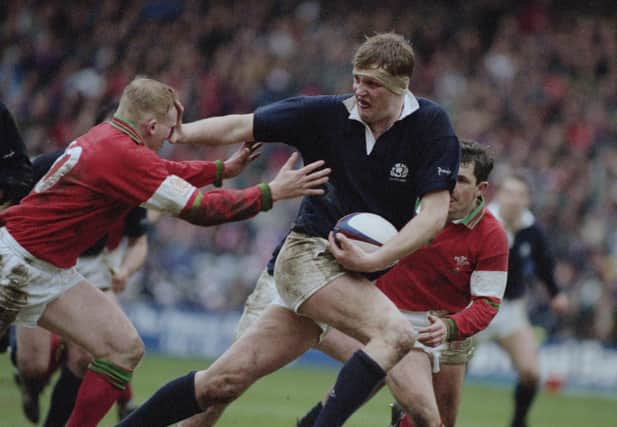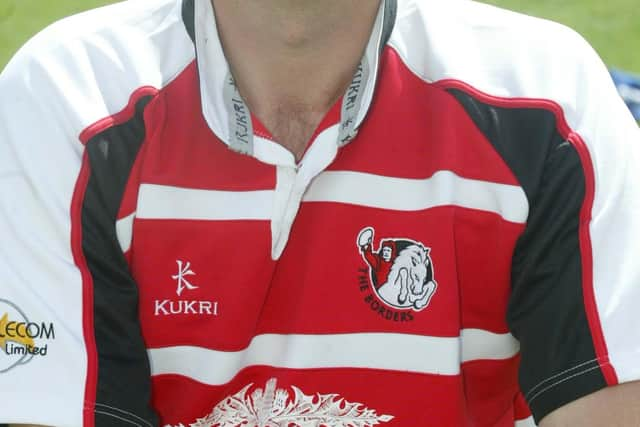'A huge, ferocious presence': Doddie Weir handled rugby's transition to pro from amateur with panache and never lost his humour


Accompanied by his wife Kathy and sons Hamish, Angus and Ben, the wheelchair-bound Weir was embraced by the captains, Jamie Ritchie of Scotland and Sam Whitelock of the All Blacks, as the other players gathered around the edge of the pitch to applaud the former lock forward. Here was the cream of the modern game coming together to salute one of their own, someone who had dealt with cruel fortune in an extraordinary way. It was a moving and fitting moment on what was to be his last hurrah at Murrayfield.
Weir, whose death was announced on Saturday evening at the age of 52 and six years after he was diagnosed with motor neurone disease, injected enthusiasm into all he did and his popularity extended far beyond rugby and Scotland. His contribution to the sport in this country cemented his place in the affections of the public but it was the way he responded to his MND diagnosis that marked him out as a figure of remarkable fortitude.
Advertisement
Hide AdAdvertisement
Hide AdHe campaigned tirelessly to raise awareness of the disease and went on to raise millions through his My Name'5 Doddie foundation in a bid to fund research to find a cure.


After Scotland’s narrow defeat by New Zealand, Ritchie eloquently explained what meeting Weir before the match meant to him. “Rugby has given me some pretty special moments but I don’t think any will be more meaningful than this one,” he said. “It was a privilege to share this moment with Doddie and his family, it’s something I will never forget. I do not have the words to describe how inspirational he is to us.”
Tall, gangling and irrepressible, Weir’s beanpole physique and natural sense of fun could sometimes mask the outstanding rugby player within. The incomparable Bill McLaren once described him as being “on the charge like a mad giraffe” and opponents underestimated him at their peril. A brief perusal of his playing CV would tell you that this was a modern forward who handled the sport’s transition from amateur to professional in the 1990s with panache. And he did so without sacrificing his love of the game or sense of humour.
Jim Telfer spoke of Weir having a rugby switch he could flick on and off. When it was off, Weir could annoy the great coach with his horseplay and antics. “He’s the village idiot, loud – very loud – gregarious, doing daft things like nudging you when you’re off balance, or grabbing you and sticking his finger in your ear,” Telfer wrote in the foreword to Weir’s autobiography. “But when that switch was on, as a rugby player, whether with club or country, Doddie was a completely different animal: focused, concentrated, confident, a huge presence, ferociously proud and committed, and immensely physical.”
A serial trophy winner with Melrose, he was soon sought out by English rugby’s big guns and joined the paid ranks with Newcastle Falcons where more league and cup honours followed. Already a seasoned Scotland international by this point, Weir’s abilities saw him selected by the British & Irish Lions for their tour of South Africa in 1997. Unsurprisingly, he was a popular tourist and it was a great shame that he had to come home early due to a knee injury, the victim of a cynical piece of foul play during a midweek match against Mpumalanga Province.


His emergence on the international arena came just after Scotland’s 1990 Grand Slam success and he made his debut against Argentina in November of that year. He would go on to win 61 caps and was part of the squad which won the final Five Nations Championship in 1999, although injury again limited his contribution.
Injuries aside, his career was a stellar one. As well as winning national titles on both sides of the Border and playing for the Lions, Weir appeared at three Rugby World Cups, helping Scotland reach the semi-finals in 1991 – their best ever showing – and the quarter-finals in both 1995 and 1999.
Although born in Edinburgh, Weir was a Borders boy, raised at Cortleferry farm, near Stow. He attended the nearby Fountainhall Primary School before making the switch to Stewart’s Melville College from primary six onwards. The move to the Edinburgh school came as something of a culture shock but undoubtedly helped his rugby development, even if he was something of a late developer.
Advertisement
Hide AdAdvertisement
Hide AdWeir’s first sporting love was horse riding but for someone who would grow to be 6ft 6in he was hardly suited to life in the saddle. His stature was more useful for goalkeeping and he turned out between the sticks for Stow amateurs in his late teens. But his height and athleticism made him a natural for the second row and his rugby career quickly blossomed in adulthood.
For Telfer, Weir’s arrival on the scene was a heaven sent. “For me, having coached Melrose and Scotland for years, without having any real ability in lineout play, Doddie was a godsend,” said the coach. “When he came into the reckoning for Scotland, what a bonus it was. At last we had someone who jumped up, not down!”
